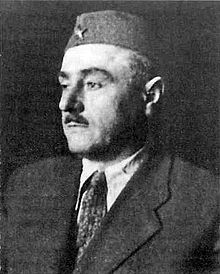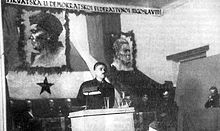Andrija Hebrang (politician, 1899)
Andrija Hebrang (born October 21, 1899 in Baćevac near Virovitica ; † June 11, 1949 in Belgrade ) was a Croatian-Yugoslav politician and statesman who was accused of being a spy in 1948 and presumably killed.
Life
Andrija Hebrang was a leading functionary of the Communist Party in Croatia before and during the Second World War . During the war he was the leading figure of the ZAVNOH ( Antifascist Council of the People's Liberation of Croatia ). In his public appearances, he always emphasized the importance of Croatia's independence within Yugoslavia.
Hebrang's clearly pro-Croatian and allegedly chauvinistic remarks brought him several reprimands by the party leadership, including by Tito . Hebrang was captured and interrogated by the Ustaše in 1942, but was released shortly afterwards as part of a prisoner swap. According to Vladimir Dedijer , there were circumstantial evidence during the war that cast doubt on Hebrang's loyalty to the Yugoslav people's liberation movement.
Hebrang became a minister in the Tito government after the war. He was removed from political life in 1948 as a result of Tito's break with Stalin and imprisoned in Belgrade's notorious Glavnjača prison. Hebrang was accused of since his capture in 1942 Gestapo and the Ustasha -Geheimdienst US (from 1943: GRAVSIGUR ) to have worked; after the war he is said to have spied for the NKVD . He disappeared without a trace on June 11, 1948 and is said to have committed suicide in prison according to official reports. However, it is believed that Hebrang was liquidated by the Yugoslav secret police UDB under Aleksandar Ranković .
Hebrang's wife and their three children were subjected to severe reprisals from the communist regime. So they were not allowed to bear the name Hebrang.
Hebrang 's son of the same name studied medicine and eventually became a university professor in Zagreb. He only came out of anonymity after the breakup of Yugoslavia, when he became one of the closest collaborators of President Franjo Tuđman . He became a member of the Croatian Parliament and held the offices of Minister of Health and Defense .
Rehabilitation of Hebrangs
In Croatia there was already a powerful movement to rehabilitate Hebrang in Tito's time. According to Tito's comrade in arms and friend Josip Kopinič , Hebrang had "powerful protectors who want to rehabilitate him and at the same time want to prevent the truth from being written about him".
In Croatia, Hebrang is said to have been rehabilitated in 1992 by a parliamentary resolution. In April 2009 he was also rehabilitated by the Belgrade District Court.
literature
- Jill A. Irvine: The Croat Question: Partisan Politics in the Formation of the Yugoslav Socialist State . Zagreb 2001, ISBN 0-8133-8542-3 .
Web links
- Website Andrija Hebrang
- E-Book - The Political Reality of Yugoslavism (1918-1991)
- E-Book - "Europe from the Balkans to the Urals"
Individual evidence
- ↑ a b c 100th anniversary of the birth of Andrija Hebrang ( Memento of the original from April 8, 2014 in the Internet Archive ) Info: The archive link was inserted automatically and has not yet been checked. Please check the original and archive link according to the instructions and then remove this notice. at posta.hr, accessed on November 22, 2015.
- ↑ Vrijeme za istinu: Gdje je pokopan Andrija Hebrang? from andrija-hebrang, accessed on November 22, 2015.
- ↑ chief communist rehabilitated (taz of April 15, 2009)
| personal data | |
|---|---|
| SURNAME | Hebrang, Andrija |
| BRIEF DESCRIPTION | Croatian communist resistance fighter during the Second World War |
| DATE OF BIRTH | October 21, 1899 |
| PLACE OF BIRTH | Baćevac near Virovitica |
| DATE OF DEATH | June 11, 1949 |
| Place of death | Belgrade |


